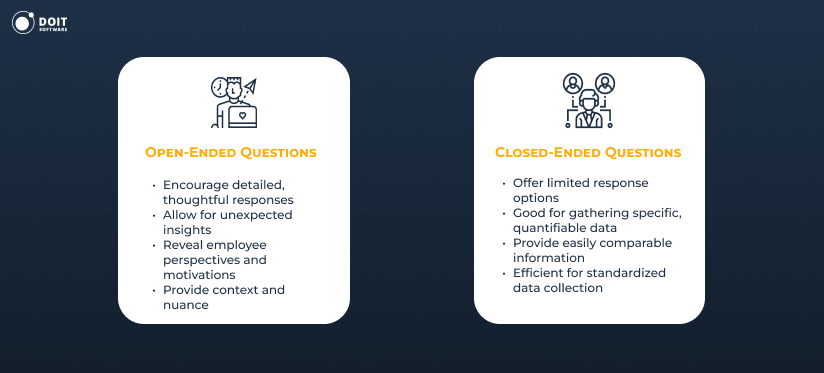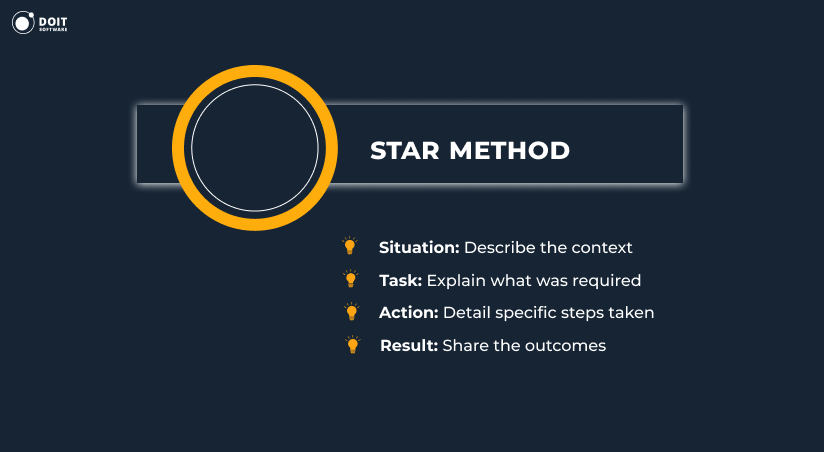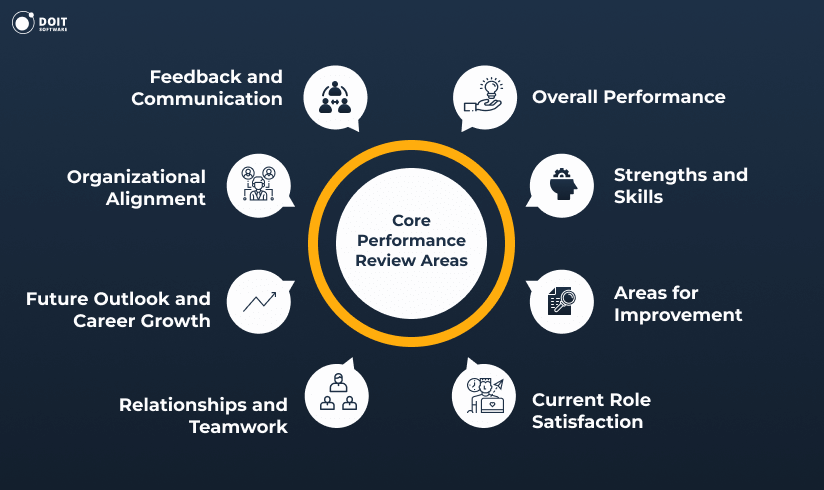Performance reviews provide a structured opportunity for evaluation, goal-setting, and career development. However, many managers fail to conduct effective reviews, leaving employees potentially without feedback.
As a result, 74% of millennials feel “in the dark” about their work progress. Moreover, 3 in 4 Gen Z employees are willing to resign if they don’t receive regular feedback. While older generations are less vocal, more than half recognize the need for consistent communication. These numbers underscore the critical importance of asking the right performance interview questions.
This article will guide you through crafting impactful discussions. We’ll explore different question types, best practices, and common pitfalls.
Let’s look at some key numbers related to performance reviews.
So, what are good performance review questions? Let’s explore together.
Impactful performance review questions are key for meaningful evaluations and actionable feedback. Thus, balancing question types, ensuring clarity, and avoiding biases are vital steps. Let’s see how to master each of these aspects.
When preparing for performance reviews, it’s important to consider both open-ended and closed-ended questions. The former encourage detailed, thoughtful responses, allowing individuals to express themselves freely. They are invaluable for understanding an employee’s perspective, challenges, and aspirations.
For example, asking, “How have you contributed to the team’s success over the past year?” fosters self-reflection and can reveal unexpected insights. Inquiries like “How do you see your role evolving in the coming year?” can reveal an employee’s aspirations and ideas.
On the other hand, closed-ended questions offer a limited set of response options, making them ideal for gathering quantifiable data. They’re efficient for collecting standardized information across multiple reviews. A question like “On a scale of 1-5, how would you rate your job satisfaction?” provides easily comparable data.

Both types of questions have their place in a well-rounded performance review. Open-ended ones provide context and nuance, while closed-ended ones offer clear, measurable data points.
Behavioral-based performance review questions require specific examples of how employees handled past situations. Such an approach offers valuable insights into their skills, decision-making processes, and problem-solving abilities.
The STAR method provides a structured framework for asking and answering these questions. STAR stands for Situation, Task, Action, and Result. When using this method, the employee describes the context of an event and details the specific steps they took.

For example, a performance evaluation question using this approach might be: “Tell me about a time when you faced a significant challenge at work. What was the situation, what did you need to do, what actions did you take, and what was the result?”
This method offers several benefits. It elicits concrete examples and allows reviewers to evaluate how employees apply their skills. The STAR method also ensures consistency across multiple questions, providing a fair review process. Moreover, past behavior can be indicative of future performance, giving this approach predictive value.
When using the STAR method, it’s important to prepare various questions covering different competencies and skills. Allow enough time for employees to think and respond fully. Also, listen actively and ask follow-up questions if needed. Encourage them to use “I” statements to focus on their individual contributions.
For example, ask about instances when the employee faced a tight deadline or mediated a conflict with a colleague. These inquiries offer a holistic perspective on the employee’s abilities and experiences.
Incorporating action verbs into your performance review questions can significantly improve their clarity. Instead of asking, “How was your performance this year?” try more targeted questions such as “What specific goals did you accomplish this year?”.
It’s beneficial to use a variety of action verbs to cover different aspects of performance. Verbs like “achieved,” “completed,” and “improved” focus on accomplishments. “Resolved,” “analyzed,” and “implemented” relate to problem-solving. For teamwork, consider verbs such as “collaborated,” “coordinated,” and “mentored.”
Combining action verbs with specific metrics or time frames can make questions more effective. For instance, “How did you increase customer satisfaction ratings over the past quarter?” or “What steps did you take to reduce project costs by 15%?”.
Using action verbs in your performance review questions creates a more engaging and insightful evaluation process. You will also get a clearer understanding of an employee’s contributions and potential.
When crafting employee performance review questions, avoiding leading or biased ones is crucial. Failure to do so can significantly skew responses and limit the value of the feedback received.
Leading questions subtly (or sometimes overtly) push the respondent toward a particular answer. They often contain assumptions or suggest a “correct” response. Let’s take the question, “Don’t you think the new system has greatly improved efficiency?” It assumes the new system has improved efficiency and nudges the employee to agree.
Biased questions, on the other hand, reflect the questioner’s prejudices or preconceptions. They can be based on various factors such as personal preferences, stereotypes, etc. An example of a biased question might be, “As a younger employee, do you find it difficult to respect authority?” It makes unfounded assumptions based on age and fails to consider workplace equity.
To avoid these pitfalls, it’s essential to rephrase such questions in a neutral manner. In the earlier scenario about the new system, you could ask, “How has the new system affected your work efficiency?” This way, the employee feels empowered to provide honest assessment without feeling pressured to give a particular answer.
Here are some strategies to help craft unbiased performance review questions:
It’s also beneficial to have a diverse group of people review your questions before finalizing them. Different perspectives can help identify potential prejudices that you might have overlooked. This approach is backed up by the facts: 58% of companies now train teams to recognize unconscious biases.
Remember, performance review questions aim to gather honest feedback that can help both the employee and the organization grow.
Be specific when developing performance review questions for employees. Focus on aspects that align with the employee’s job responsibilities and organizational objectives.
Encourage self-reflection by including questions that prompt employees to assess their own performance. Also, don’t forget to focus on the future.
Remember to tailor questions to the specific role and level of the employee. Questions for a junior employee might focus more on skill development. For a senior employee, the emphasis shifts to leadership and strategic thinking.
Here’s an in-depth look at key areas to cover, along with specific performance review questions to ask employees:

Overall Performance
This section focuses on the employee’s general achievements, challenges, and motivations over the review period.
These questions to ask during performance review offer insights into an employee’s contributions. They also highlight areas for potential growth.
Good performance review questions in this area help identify an employee’s unique talents.
Incorporating these employee evaluation questions ensures that skills are effectively aligned with team needs.
Questions to ask in a performance review should address challenges and growth opportunities with specificity.
These questions to ask at performance reviews make it possible to address any challenges systematically and effectively.
This section explores how well the employee’s current position aligns with their skills and interests.
These best questions to ask employees during performance reviews are crucial for improving job satisfaction and motivation.
Employee review questions should also cover interpersonal dynamics and collaboration in detail.
These performance evaluation questions are essential for fostering a productive and supportive work environment.
The best performance review questions look forward to addressing the employee’s career aspirations.
These questions to ask employees during performance review ensure that individual aspirations align with organizational goals.
This section ensures the employee’s work aligns with broader company objectives.
These performance review questions foster greater organizational cohesion and effectiveness.
These questions focus on improving the feedback process and communication channels.
Including these questions to ask during performance review fosters a culture of openness and continuous improvement.
Good questions for performance reviews facilitate understanding between managers and employees. They help both gain valuable insights and give a chance to reflect on work and growth.
When selecting questions to ask employees during performance reviews, addressing several areas is important. Start by evaluating overall output to see how well employees meet their responsibilities. Then, look into their strengths to understand what they do well and how it benefits the team.
Focus on areas for improvement to pinpoint challenges and opportunities for growth. Assess job satisfaction to gauge employees’ feelings about their roles and work environment. Finally, discuss future goals to align their career aspirations with the organization’s objectives. Additionally, you can track employee attendance to identify patterns that may affect productivity and engagement, ensuring that the organization can proactively address any underlying issues.
Performance reviews are most valuable when conducted with skilled and motivated staff. Having top talent allows for deeper insights and more meaningful discussions. Are you looking for developers who excel in their roles and contribute to more effective performance reviews? Share your requirements with us! We’ll provide you with CVs of the best candidates within days.
Get a consultation and start building your dream team ASAP.
Request CVsPerformance review questions should address achievements and goal attainment. Moreover, they should cover challenges faced and desired skill development. They should encourage employees to reflect on their performance and growth areas.
Reflective questions aim to prompt self-assessment of professional growth. They also evaluate the effectiveness of feedback received and lessons learned from experiences.
Evaluation questions focus on overall performance rating, goal achievement, demonstration of key competencies, etc.










